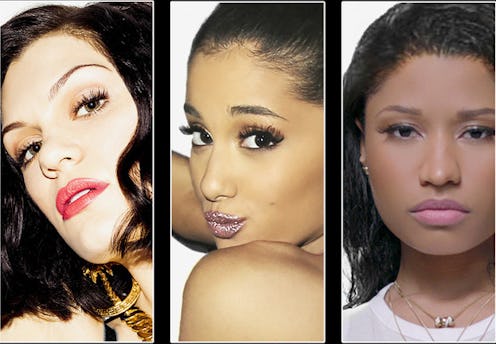Entertainment
Is "Bang Bang" A Feminist Anthem?
When "Bang Bang" by Jessie J, Ariana Grande and Nicki Minaj leaked last Monday, I totally lost my mind. My first course of action was to listen to the song and go absolutely insane. My second course of action was to text a friend a bunch of nonsense by mashing my iPhone keyboard in a fit of uncontrollable excitement. My third and final course of action was to, of course, put "Bang Bang" on repeat for hours and hours on end. When I closed my eyes to go to sleep on Monday night, "Bang bang, into the room..." was all I could hear — the sweetest lullaby. Needless to say, it was an eventful day for pop music–obsessed Alex.
Naturally, it wasn't long before the lyrics to "Bang Bang" became seared into my brain. Once I stopped spazzing out and really listened to what the song had to say, I asked myself: "Is 'Bang Bang' a feminist anthem, a sort of response to Robin Thicke's now infamous 2013 single, 'Blurred Lines'? Or are its lyrics just as problematic?" Let's investigate.
To start, "Bang Bang" puts three powerful women — two phenomenal singers and one insanely talented rapper — together on the same track, and there's really no denying just how cool that is.
As I listened to Jessie, Grande, and Minaj brag about their sexual prowess throughout the song, I thought: "Wow. We are definitely not used to hearing women speak so freely and confidently about sex in pop music. This is awesome!" On "Bang Bang," women call all the shots. In fact, the song even employs one of the most offensive phrases from Thicke's "Blurred Lines," "I know you want it," as if to say, "Listen up, dudes! You've been claiming to know what women 'want' in pop music for years — now it's our turn."
Similarly, in the context of the song, one of the following lines, "I'll let you have it," doesn't come off as a weak concession to a man, but rather, as a powerful promise: "Brace yourself, man — you don't know what you're in for." I think it's safe to say that "Bang Bang" represents a fairly significant power shift in pop music — women are in complete and total control of their sexualities while men have become the objects of desire. But this is where things get a little tricky...
"Bang Bang," much like "Blurred Lines" before it, brings up issues of consent. Are lyrics like, "I know you want it" and "I'll let you have it," any better or more acceptable coming from women? Has "Bang Bang" merely turned women into aggressors? Can women really derive any strength from this kind of role reversal?
I realize that the answers to those questions will vary, but for me, it's still very significant to hear women talking so openly about sex in a pop song — the way men have been "allowed" to talk about sex in music for years. At the same time, I don't know how comfortable I am with lyrics like, "I know you want it," regardless of who's singing them. Like I said, it's a tricky situation.
One thing's for sure: The general public is responding very well to "Bang Bang" so far. The song's been sitting pretty in the No. 1 spot on the iTunes singles chart since its release. I have a feeling we're going to be hearing "Bang Bang" a lot on the radio in the coming months. Because pop music has the ability to influence culture, I think this is definitely a conversation worth having.
Images: nickiminaj/Instagram
